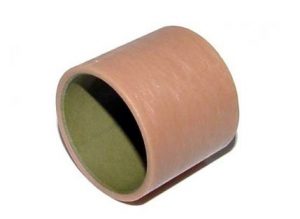 Fibre wound bearings withstand environments that metal bearings can’t
Fibre wound bearings withstand environments that metal bearings can’t
August 26, 2016 REDWIRE is news you can use from leading suppliers. Powered by FRASERS.
Posted by Daemar Inc.
Daemar manages the sourcing and delivery of millions of Essential Components to the manufacturing and MRO marketplace. I... Read more
Subscribe
Free REDWIRE e-newsletter

Daemar offers the DMR Fibre Wound Series bearings for non-lubricated high load applications. These composite bearings are self-lubricating and feature low friction values and corrosion resistance. They are suitable for use in a variety of climates and operating environments. Because these bearings won't rust, they can be used in environments where traditional metals cannot.
Bearing applications
DMR fibre wound bearings are used in a wide range of applications, including robotics, farm implements, packaging machinery, marine pivots, mining equipment and nuclear power plants. They offer high load capacity that's on par with bronze, powdered metal and steel, but provide longer operating life and less wear with no need for lubrication.
For drop-in replacement of steel and bronze bearings, Daemar's fibre wound bearings are available with thick walls. They are an excellent choice for combination motion-oscillatory, linear and rotary applications, and offer a cost competitive solution, as they can be used against mild steel shafting.
Bearing design
The DMR Fibre Wound FL (CJ) type bushings have a multilayered structure. The innermost layer consists of synthetic and PTFE fibres. This material has been proven with many years of success as a bearing wear surface for rod end and aircraft spherical bearings.
The second and third layers are made from epoxy-coated glass filaments, with high and low angles, respectively. This type of bushing was originally designed for pressure vessels and rocket motor cases. The materials provide lightweight, high strength and fatigue resistance.
The ability to select the fibre angles for this material enables optimization of strength and rigidity. The material is also rigid enough to handle heavy loads, yet compliant enough to accommodate moderate shaft misalignment without putting the bearing corners under high stress.
For more information, visit Daemar's website.
Share
Posted by Daemar Inc.
Daemar manages the sourcing and delivery of millions of Essential Components to the manufacturing and MRO marketplace. I... Read more
